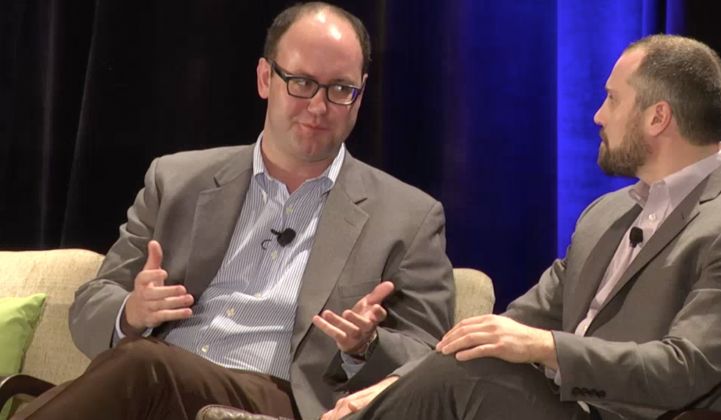In Travis Kavulla's eyes, there are two types of Republican utility regulators.
One is more likely to side with incumbent monopolies. "The first type says, 'I'm a Republican and that means I'm pro-business. And here's this utility, that's a business after all -- where's the rubber stamp? Where do I sign?'"
The other is more likely to side with open markets. And that's how Kavulla, president of the national organization representing state utility regulators around the U.S., describes himself.
"I’m a Republican who happens to think...this is a monopoly industry laden with perverse incentives to over-invest in capital on the part of the utility. I’m very skeptical of the type of corporate behavior that results from a cost-of-service regulatory monopoly."
Speaking at GTM's Solar Market Insight conference on Tuesday, Kavulla outlined his philosophy on how to open up electricity markets to competition, improve communications between utilities and outside parties, and simplify the country's decarbonization efforts. (Subscribers to GTM Squared can access the entire video here.)
"The Republican message from a utility regulatory standpoint has become confused about its core principles, which should commit to retail choice and opening up these markets to the degree possible," he said.
Kavulla is vice chairman of Montana's public service commission. Last year, he was elected president of the National Association of Regulatory Utility Commissioners, a 127-year-old nonprofit that represents state public utility regulators.
Under Kavulla, NARUC launched an unprecedented effort to craft guidance around ratemaking for distributed resources. Although the process inevitably caused some hand-wringing among stakeholders, it was the first time the organization approached outside parties for input on a regulatory manual. And it showed that NARUC is serious about getting the energy transition right.
"It is really intended to be a practical manual that offers regulators...a set of questions they should be asking -- as well as ideas for the type of data they should be collecting -- in case they do want to look under the hood of ratemaking for [distributed energy resources]," said Kavulla, explaining the origin of the document. The final draft will be released in mid-November, along with all the comments from participants.
The manual doesn't tell regulators whether net metering -- a blunt, and increasingly controversial, policy for promoting solar -- is a good or bad option. But it does encourage them to conduct studies of the locational and environmental value of distributed resources.
Kavulla summed up his take on the issue: "You need to collect the data first."
However, he isn't convinced that net metering is the most efficient way to promote solar.
"Net metering is incredibly simple. In the absence of information of what capacity costs you can avoid...it's a good default option. But beyond that, I don't think there are particularly strong arguments for it on behalf of economic efficiency," he said.
And as solar advocates push for more value-of-solar proceedings, they are implicitly saying that net metering isn't the best option, argued Kavulla. "That’s not an argument for net metering; that’s an argument for value-of-solar and the data collection that this manual tries to target."
Kavulla isn't interested in holding on to a policy like net metering because it's popular. For him, the distributed energy transition comes down to a basic principle: Continue exploring the most economically efficient ways to open up markets. And that may mean restructuring rates and incentives in a whole host of ways.
"It begins, I think, with a recommitment to the idea that customers wherever possible should be able to choose," he said. "You try to step back, or you try to set up a marketplace where there are a larger number of financial parties and interests. That’s fundamentally the way this works." He pointed to New York, which is undertaking radical market reform, as an example.
Kavulla is a realist. He knows that scrapping mandates and carve-outs is highly unlikely. But in order to open up electricity markets to third parties in fundamentally new ways, legislators and regulators also need to revisit the patchwork of policies that have historically favored specific clean energy technologies, he argued.
"It would be much better for both consumer choice and for industries like this one if we replaced all of those policies with a more simple and efficient price or tax on carbon," said Kavulla.
"You have renewable tax credits, renewable mandates, storage mandates, rebates for certain customer classes for various types of installations, technology carve-outs all over the place, all of them ostensibly aiming at a decarbonized energy portfolio. But they’re duplicative and confusing, and they create a...boom and bust. Live by the mandate, die by the mandate."
This type of approach causes pushback from all sides. Advocates of distributed energy don't like the idea of stripping away mandates or net metering -- and few think it's politically feasible to replace them with a simple carbon price. And many utilities may bristle at the idea of opening up competition.
But as an increasingly diverse range of stakeholders come together to shape the future of the grid, this no-nonsense approach may just win respect.
"Trying to get politicians to actually be leaders and to rationalize this marketplace in terms of economic efficiency might be doing the Lord’s work. This is never going to be a winner. It requires politicians who realize the sorry state of confused, overlapping, cost-additive energy policies," said Kavulla.



